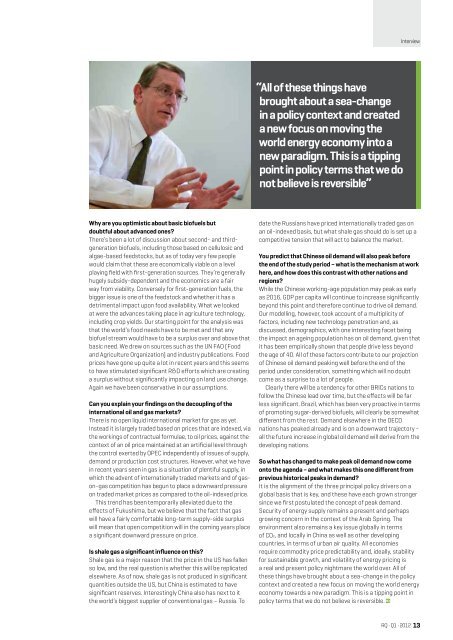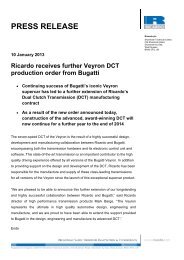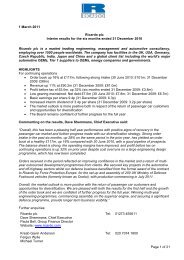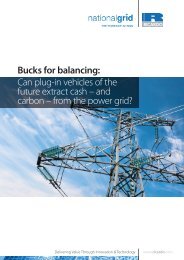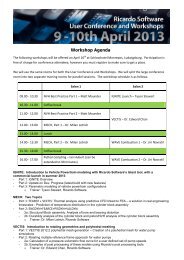Peak - Ricardo
Peak - Ricardo
Peak - Ricardo
Create successful ePaper yourself
Turn your PDF publications into a flip-book with our unique Google optimized e-Paper software.
Interview<br />
“All of these things have<br />
brought about a sea-change<br />
in a policy context and created<br />
a new focus on moving the<br />
world energy economy into a<br />
new paradigm. This is a tipping<br />
point in policy terms that we do<br />
not believe is reversible”<br />
Why are you optimistic about basic biofuels but<br />
doubtful about advanced ones?<br />
There’s been a lot of discussion about second- and thirdgeneration<br />
biofuels, including those based on cellulosic and<br />
algae-based feedstocks, but as of today very few people<br />
would claim that these are economically viable on a level<br />
playing field with first-generation sources. They’re generally<br />
hugely subsidy-dependent and the economics are a fair<br />
way from viability. Conversely for first-generation fuels, the<br />
bigger issue is one of the feedstock and whether it has a<br />
detrimental impact upon food availability. What we looked<br />
at were the advances taking place in agriculture technology,<br />
including crop yields. Our starting point for the analysis was<br />
that the world’s food needs have to be met and that any<br />
biofuel stream would have to be a surplus over and above that<br />
basic need. We drew on sources such as the UN FAO (Food<br />
and Agriculture Organization) and industry publications. Food<br />
prices have gone up quite a lot in recent years and this seems<br />
to have stimulated significant R&D efforts which are creating<br />
a surplus without significantly impacting on land use change.<br />
Again we have been conservative in our assumptions.<br />
Can you explain your findings on the decoupling of the<br />
international oil and gas markets?<br />
There is no open liquid international market for gas as yet.<br />
Instead it is largely traded based on prices that are indexed, via<br />
the workings of contractual formulae, to oil prices, against the<br />
context of an oil price maintained at an artificial level through<br />
the control exerted by OPEC independently of issues of supply,<br />
demand or production cost structures. However, what we have<br />
in recent years seen in gas is a situation of plentiful supply, in<br />
which the advent of internationally traded markets and of gason-gas<br />
competition has begun to place a downward pressure<br />
on traded market prices as compared to the oil-indexed price.<br />
This trend has been temporarily alleviated due to the<br />
effects of Fukushima, but we believe that the fact that gas<br />
will have a fairly comfortable long-term supply-side surplus<br />
will mean that open competition will in the coming years place<br />
a significant downward pressure on price.<br />
Is shale gas a significant influence on this?<br />
Shale gas is a major reason that the price in the US has fallen<br />
so low, and the real question is whether this will be replicated<br />
elsewhere. As of now, shale gas is not produced in significant<br />
quantities outside the US, but China is estimated to have<br />
significant reserves. Interestingly China also has next to it<br />
the world’s biggest supplier of conventional gas – Russia. To<br />
date the Russians have priced internationally traded gas on<br />
an oil-indexed basis, but what shale gas should do is set up a<br />
competitive tension that will act to balance the market.<br />
You predict that Chinese oil demand will also peak before<br />
the end of the study period – what is the mechanism at work<br />
here, and how does this contrast with other nations and<br />
regions?<br />
While the Chinese working-age population may peak as early<br />
as 2016, GDP per capita will continue to increase significantly<br />
beyond this point and therefore continue to drive oil demand.<br />
Our modelling, however, took account of a multiplicity of<br />
factors, including new technology penetration and, as<br />
discussed, demographics, with one interesting facet being<br />
the impact an ageing population has on oil demand, given that<br />
it has been empirically shown that people drive less beyond<br />
the age of 40. All of these factors contribute to our projection<br />
of Chinese oil demand peaking well before the end of the<br />
period under consideration, something which will no doubt<br />
come as a surprise to a lot of people.<br />
Clearly there will be a tendency for other BRICs nations to<br />
follow the Chinese lead over time, but the effects will be far<br />
less significant. Brazil, which has been very proactive in terms<br />
of promoting sugar-derived biofuels, will clearly be somewhat<br />
different from the rest. Demand elsewhere in the OECD<br />
nations has peaked already and is on a downward trajectory -<br />
all the future increase in global oil demand will derive from the<br />
developing nations.<br />
So what has changed to make peak oil demand now come<br />
onto the agenda – and what makes this one different from<br />
previous historical peaks in demand?<br />
It is the alignment of the three principal policy drivers on a<br />
global basis that is key, and these have each grown stronger<br />
since we first postulated the concept of peak demand.<br />
Security of energy supply remains a present and perhaps<br />
growing concern in the context of the Arab Spring. The<br />
environment also remains a key issue globally in terms<br />
of CO2, and locally in China as well as other developing<br />
countries, in terms of urban air quality. All economies<br />
require commodity price predictability and, ideally, stability<br />
for sustainable growth, and volatility of energy pricing is<br />
a real and present policy nightmare the world over. All of<br />
these things have brought about a sea-change in the policy<br />
context and created a new focus on moving the world energy<br />
economy towards a new paradigm. This is a tipping point in<br />
policy terms that we do not believe is reversible.<br />
RQ • Q1 • 2012 13


